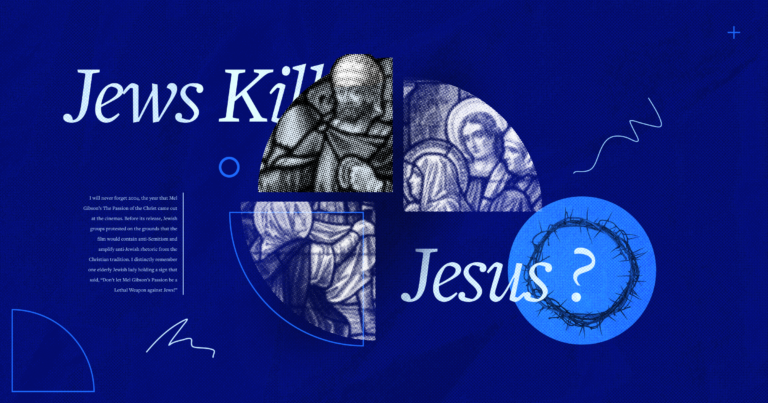1 Peter 3:18–22 is one of the most challenging passages in all of the New Testament. What does it mean that Jesus “preached to the spirits in prison”? Did he descend into hell? Was he speaking through Noah in the past, offering the deceased a second chance at salvation, or something else?
In this episode of What in the Word?, Kirk E. Miller sits down with renown New Testament scholar Thomas Schreiner to explore the various interpretations, as well as their practical significance.
Follow the show on YouTube, Spotify, Apple Podcasts, and more.
https://youtu.be/3Ot8ZxJ0TJ8
Special offers
A Free Book Just for You
Logos has given away over 5 million free books, empowering Christians globally to study deeply. Get a shiny, new free book every month!
Exclusive Lexham Press Tough Texts Bundle
Have more questions about the Bible? Get the 10-volume Lexham Press Tough Texts Bundle designed exclusively for fans of What in the Word?
The Future of Bible Study is Here
Unlock in-depth study of God’s Word, plus exclusive discounts, free books, and more starting as low as $9.99/month—only with the new Logos.
Connect with us
Ready to increase biblical literacy? Like and share. To go the extra mile, leave us a review on your preferred platform.
Subscribe to get future episodes. (Bonus: We’ll send you a discount to use on your first purchase.)
Thanks for subscribing to Word by Word!
Use code WORDBYWORD to save 10% on your first order.
WORDBYWORD Copy code
Episode guest: Thomas Schreiner
Thomas Schreiner is the James Buchanan Harrison professor of New Testament interpretation and associate dean for Scripture and interpretation at The Southern Baptist Theological Seminary in Louisville, Kentucky. Tom is a Pauline scholar who has written extensively on the subject.
He is married to Diane and they have four children. Schreiner is a member of Clifton Baptist Church in Louisville, Kentucky.
Episode synopsis
Setting the stage: suffering and hope in 1 Peter
Kirk E. Miller and Thomas Schreiner open by presenting the broader context of the letter of 1 Peter. This epistle, written to Christians facing persecution and marginalization, calls believers to endure suffering with hope. This exhortation is grounded in the example of Christ’s own suffering and victory, a theme that comes to the forefront in this controversial passage.
Tom emphasizes that the theme of suffering leading to glory permeates 1 Peter. Believers are to conduct themselves with holiness and readiness to witness, even in the face of opposition. The “righteous for the unrighteous” language in verse 3:18 recalls Isaiah 53 and highlights the substitutionary nature of Christ’s suffering. But it’s in this context of victory through suffering that Peter introduces the enigmatic proclamation to the “spirits in prison.”
The issues involved in interpretation
1 Peter 3:18–22 raises the question: What does it mean that Christ “went and proclaimed to the spirits in prison”? Is this a descent into hell, a proclamation to the deceased, or something else entirely?
Involved is a series of complex interpretive questions:
- Who are the “spirits in prison”?
- When did Christ proclaim to them?
- What did he proclaim?
Surveying the views while resisting dogmatism
Tom notes that even Martin Luther, one of the boldest exegetes in church history, confessed confusion about this text. It’s a “hard nut to crack” and not something upon which dogmatic positions should be built. Given these challenges, Schreiner encourages interpretive humility and theological charity when navigating the text.
With scholarly care and pastoral clarity, Tom walks listeners through the contextual, theological, and linguistic dimensions of this passage, presenting various interpretive views along with his own conclusion.
1. Christ preached to Noah’s contemporaries through Noah
This view, going back to Augustine and popular among some evangelical scholars like Wayne Grudem, holds that Christ “proclaimed” through Noah by means of the Holy Spirit. According to this interpretation, Jesus preached to individuals during Noah’s day who Peter here describes as “spirits in prison.” That is, by the time Peter is writing, they are now deceased. They are “in prison,” having died in their disobedience and now await the final judgment.
Arguments for
- Sees “in the Spirit” as referring to the Holy Spirit’s activity through Noah.
- The verb κηρύσσω (“proclaim”) is often used for gospel preaching.
- The word “spirits” can refer to deceased human spirits (e.g., Heb 12:23).
Arguments against
- “Spirits” in the plural (from “spirits in prison”) more commonly refers to angels or demons.
- “Prison” (φυλακή) is never used in the New Testament as a postmortem location for human souls, but it does refer to the location of punishment for fallen angels (e.g., Rev 20:7).
- The phrase “he went” seems awkward if Christ never literally “goes” anywhere in this view but only preaches by means of the Spirit’s activity through Noah.
- It’s unclear what it would mean for Christ to be “made alive” in the Spirit according to this view. It seems quite a stretch to describe Noah’s preaching in the Spirit as Christ being “made alive.”
- Peter’s outlining of Christ’s sequential death, resurrection, and ascension would be disrupted by this interpretation.
2. Christ descended into hell & preached after his death
This view interprets the passage as describing Christ descending into Hades (or hell) between his death and resurrection. Variations of this view exist. According to them, during this time he either:
- Proclaimed judgment to the wicked dead
- Brought liberation to the righteous dead
- Gave a second chance to those who had never had opportunity to hear the gospel
Arguments for
- Matches traditional interpretations of the Apostles’ Creed phrase “he descended into hell.”
- Tries to account for the chronological flow: death, proclamation, then resurrection.
- Provides a theological rationale for the fate of the Old Testament saints.
Arguments against
- It’s unclear what it would mean for Jesus to be “made alive” in between his death and resurrection. What does it mean to be “made alive” in non-bodily form?
- The word “proclaimed” (κηρύσσω) is not the same as “evangelized” (εὐαγγελίζω), and does not necessarily imply a gospel offer.
- No other clear biblical support exists for the ideas of a postmortem second chance. In fact, Hebrews 9:27 says, “it is appointed once to die, and after that comes judgment.”
- Weakens the theme of suffering with perseverance in 1 Peter—why endure now if there’s a second chance?
3. Christ proclaimed his victory over demonic powers
This is Kirk and Tom’s preferred view. After his resurrection (“made alive in [or by] the Spirit”), Christ “went”—bodily, in glory—and proclaimed his victory over demonic spirits, particularly those associated with the rebellion in Genesis 6:1–4. These spirits are now “in prison,” and Jesus’s proclamation is one of judgment, not salvation.
Arguments for
The verb “went” (πορευθεὶς) appears in both 3:19 and 3:22. In 3:22, it follows a reference to Christ’s resurrection and clearly refers to his subsequent ascension. Thus, when it appears in 3:19, immediately following a reference to Christ’s resurrection (“made alive in the Spirit”), it should also be understood there to refer to Christ’s subsequent ascension. In other words, Peter is outlining a sequence: Christ’s death, resurrection, ascension. He first mentions this sequence in 3:18–19 and then, after he deviates from it to talk about the days of Noah, he returns to it again in 3:21–22, picking up where he left off.

Additional arguments
- “Made alive” (ζωοποιέω) often describes resurrection.
- “Spirits” without qualification usually refers to supernatural beings (demons or angels).
- “Prison” is a fitting metaphor for demonic confinement.
- This interpretation fits well with Second Temple Jewish tradition (e.g., 1 Enoch) and with Jude 6 and 2 Peter 2:4, which understand Genesis 6:1–4 to describe angels who were imprisoned for transgressing their boundaries in Noah’s day.
- This view would also explain why Peter begins to discuss the time of Noah, an otherwise unexpected and oddly specific aside. But, having mentioned the imprisoned angels from Genesis 6:1–4, Peter goes on to talk about the salvation of Noah and his family (Gen 6:5).
- This interpretation aligns with broader biblical teaching about Christ’s cosmic victory over demonic forces (e.g., Col 2:15).
Possible objections
- How can demons have bodies to commit sexual sin (as in Gen 6)? Schreiner responds that angels consistently appear in bodily form throughout Scripture (e.g., Gen 18–19).
- Doesn’t Matthew 22 say angels don’t marry? Yes, but that refers to angels in heaven—these demons left their assigned domain, transgressing those intended boundaries.
Practical significance
Though the theological complexities of the passage are numerous, its ultimate message is clear and pastoral: Christ has triumphed. His suffering was not a loss, but the path to glory. The demonic powers that once had dominion are now subjected to him.
Even if surrounded by evil, believers can remain hopeful because Jesus is Lord over every realm—seen and unseen. In a world where believers often feel outnumbered, discouraged, or defeated, this text is a bold declaration that Christ reigns. And Christ’s victory is our victory. His suffering is our model. His resurrection is our assurance.
This is comfort for believers enduring persecution. Peter’s readers were a marginalized, suffering minority. But just as Noah and his family, a righteous minority, were saved through judgment, so also now will faithful believers be vindicated. Just as Noah trusted God in the midst of a hostile culture, so too must believers today hold fast to their hope.
Preaching & teaching this passage
Tom and Kirk both encourage preachers and teachers to approach this text with humility. Given its complexity, they advise:
- Acknowledging there are multiple interpretive views.
- Presenting the view you find most convincing with clarity and grace, avoiding dogmatism.
- Not letting the theological weeds overshadow the pastoral point: Jesus has triumphed over every spiritual enemy.
This passage, while difficult, is deeply encouraging. It calls believers to persevere in suffering with joy, knowing that their Savior has already overcome the forces arrayed against them. It reminds believers that even in the face of the unknown, we can rest assured: Jesus has conquered, and we are secure in him.
Logos values thoughtful and engaging discussions on important biblical topics. However, the views and interpretations presented in this episode are those of the individuals speaking and do not necessarily reflect the official position of Logos. We recognize that Christians may hold different perspectives on this passage, and we welcome diverse engagement and respectful dialogue.

 1 week ago
11
1 week ago
11













 English (US) ·
English (US) ·